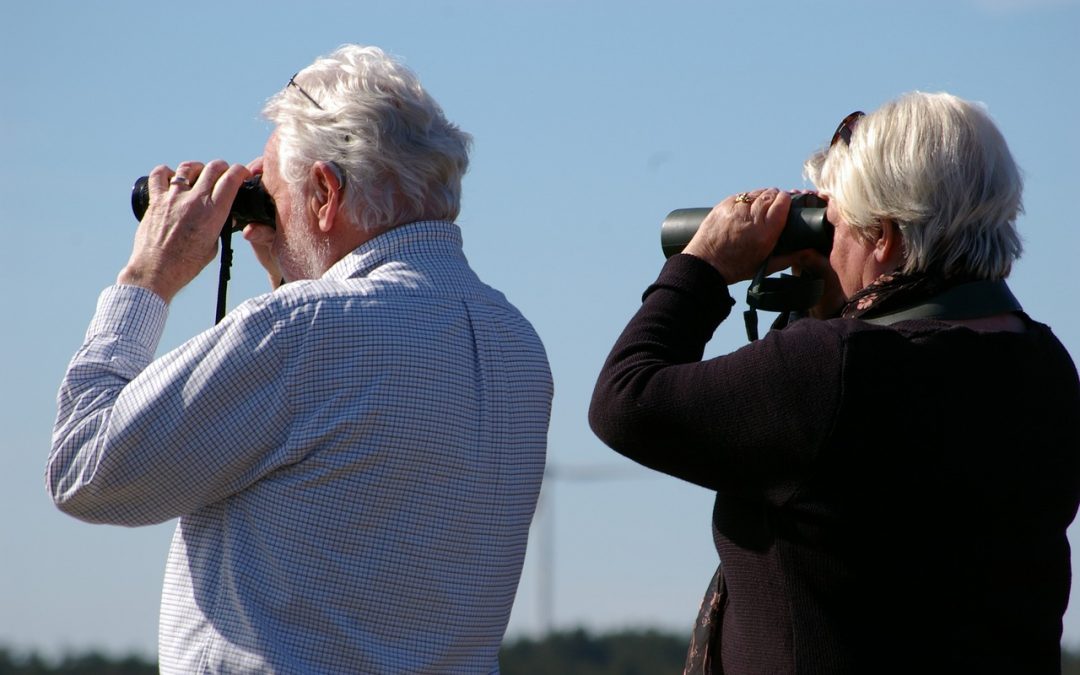If you’re in the market to find the best tools and gadgets for wildlife viewing, you may have noticed that you have a wealth of options to choose from. There are binoculars, monoculars, spotting scopes, angled spotting scopes and other such things that will make it difficult for you to know what to buy.
To start with, keep in mind that the scope of your purchase will influence your choice. You’ll need to analyze spotting scope vs binoculars for bird watching, astronomy, wildlife observation, landscape viewing, etc. to decide what would work best for you: a spotting scope, a solid pair of image stabilized binoculars or even a powerful telescope.
The main difference between binoculars and spotting scopes is that binoculars have two eyepieces and two objective lenses, while spotting scopes have only one eyepiece and one objective lens. Most spotting scopes are larger and heavier than binoculars. Because of their high magnification, spotting scopes require a tripod, a monopod or a sort of stable surface to lie on.
A spotting scope is a type of telescope specifically designed for observing objects at long distances, such as wildlife or birds. Spotting scopes are typically mounted on tripods and have a long, narrow barrel with a higher magnification than binoculars. They are generally larger and heavier than binoculars, and are not as portable.
Binoculars, on the other hand, are portable optical instruments with two telescopes mounted side by side. They are designed for observing objects at moderate to short distances and are held by hand. Binoculars are generally more lightweight and compact than spotting scopes, and are suitable for a wider range of activities, such as birdwatching, sports, or theater-going.
In general, spotting scopes are better for long-distance observation, while binoculars are more versatile and portable. The best choice for you will depend on your specific needs and preferences.
The average binocular has an objective lens smaller than a spotting scope. However, high-quality compact binoculars may also provide a great viewing experience. The average spotting scope, though, offers a closer view of the subject. Other than these, both binoculars and spotting scopes are long-range vision, magnifying optics.
Are Spotting Scopes Better than Binoculars?
There’s an old adage that says the best tool is the one you have with you. If you already own a compact binocular or an image stabilized binocular, look no further. Take it with you on your trip and try to make the most out of it. If you are currently seeking for the right optic for you, check out the following considerations to understand the pros and the cons of spotting scopes vs binoculars in case of different activities.
The best advantage of binoculars is that they are designed for using with both eyes. If you choose your binoculars wisely, you can enjoy a perfect, real life-like viewing experience. However high-power binoculars are difficult to use without a tripod, hence not being suitable for all situations.
If you need high magnification and you’re ready to carry a tripod, you may want to consider getting a spotting scope rather than binoculars, as these devices are usually superior to binoculars in terms of magnification. On the contrary, if you prefer a lighter and more portable device, binoculars will make the best choice.
Spotting Scopes vs Binoculars – Crunching the Numbers
Let’s take a look at the most important numbers and features to understand whether and how binoculars and spotting scopes are different.
Magnification
At similar price ranges, spotting scopes have better magnification. In fact, the magnification of a spotting scope depends on the eyepiece you use. Some spotting scopes have detachable eyepieces, with multiple choices available. Others have fixed eyepieces with or without zoom. Some usual zooms are 20x – 40x, 20x – 60x or 25x – 50x.
Binoculars are defined by their magnification. This is always a fixed value which can be 8x, 10x, 12x, to give you a few examples of numbers you may encounter on the most popular binoculars choices. A magnification value of 8x means that the binocular makes the viewed object appear eight times closer than when observed with the naked eye.
If you need high magnification power and you intend to use a tripod anyway, a spotting scope might suit you better than binoculars.
Field of View (FOV)
The filed of view is the width of the area visible through the optical aid at 1,000 meters distance from the observation point. A wider field of view makes it easier to observe fast-moving targets or small birds that are difficult to spot.
The higher the magnification value, the smaller the field of view will become. A too small field of view will make it very hard to follow rapidly moving targets such as birds and wildlife. Also, it will make it very difficult to frame small, remote targets such as still birds.
If a wider field of view is a must, you should choose binoculars over spotting scopes.
Minimum Focus Distance
Any optical device has a minimum focus distance. This means it can’t focus on anything closer than this value. While in case of astronomy and marine observations the close focus is less important, when it comes about wildlife observation and bird watching, it becomes quite important. Birds in your backyard may come only at 6 feet distance, so you need your optical device to be able to focus on them.
More often than not, the higher the magnification, the longer the minimum focus distance. Before deciding for a spotting scope vs binoculars, you have to assess your specific needs.
If you want a nearer minimum focus distance, you should choose binoculars.
Stability
The image stability depends on the magnification power. Usually, spotting scopes have higher magnification than binoculars. This makes them more difficult to hold steady without a tripod.
If you need a compact device to carry with you on hiking trips, you’ll probably want to choose binoculars over spotting scopes. If you want something to allow you to watch birds in your backyard, on a safari or while camping, you should check out some spotting scope models, as well.
As you can easily imagine, binoculars with image stabilization will be better than non-stabilized ones. However, if you don’t mind using a tripod or any other type of support, this shouldn’t matter as much.
Portability
A spotting scope can weigh the same as a similar quality pair of binoculars. From this point of view it makes no difference whether you choose binoculars or a spotting scope.
The difference is that binoculars are designed with portability in mind, so they are usually better suited to carry with you at all times, even in rough terrain conditions.
Price
A price comparison doesn’t make much sense. There are cheap binoculars, but also cheap spotting scopes out there. There are also extremely expensive, high-end binoculars that cost way more than the average spotting scope.
You should start by deciding upon a budget and do your research accordingly.
Next, let’s see what kind of activities you may need magnification optics for and which device would suit you best.
Spotting Scopes vs Binoculars – What Is Your Scope?
Both optical devices can work very well for any of the following purposes. Nevertheless, there are differences you may want to know about, in order to make an informed choice. It’s worth mentioning here, though, that the characteristics of specific devices may qualify them for one activity or another, regardless of it being a spotting scope or a binocular.
Your own comfort and personal preferences also play an important role in making a choice. Try to rent or borrow some devices from your friends to see which one you feel most comfortable using. Some people prefer binocular vision, while others don’t mind using only one of their eyes with such magnification devices.
Here are some quick considerations about spotting scopes vs binoculars for bird watching, safari, game spotting, and astronomy. You don’t have to take my word for it – do your own research and try to test some binoculars and spotting scopes to see how you like them.
Bird Watching
Birding call for high-quality optics, with good stability and fairly large field of view. Deciding whether to buy a spotting scope or a pair of binoculars for this purpose depends on the type of birding you prefer. If you want to watch birds in your backyard and you have the budget, a spotting scope and a sturdy tripod can make a great investment.
If, on the contrary, you want to watch birds while hiking or walking along woodland trails, you’ll be better off with a pair of compact binoculars with image stabilization. Binoculars are easier to pack and to carry around than spotting scopes. Nevertheless, if you travel by a vehicle to see birds or other wildlife, you may want to bring a spotting scope with you.
For birdwatching, both spotting scopes and binoculars can be useful tools. The best choice for you will depend on your specific needs and preferences. Here are some factors to consider when deciding between a spotting scope and binoculars for birdwatching:
- Distance: If you are primarily interested in observing birds at long distances, a spotting scope may be the better choice. Spotting scopes typically have higher magnifications and longer barrels, which make them better suited for long-range observation. On the other hand, if you are primarily interested in observing birds at moderate to short distances, binoculars may be more suitable.
- Portability: Binoculars are generally more portable than spotting scopes, as they are smaller, lighter, and can be carried by hand. If you plan on doing a lot of birdwatching on the go, or if you have limited space to carry your equipment, binoculars may be the better choice.
- Budget: Spotting scopes tend to be more expensive than binoculars, so if you are working with a limited budget, binoculars may be the more cost-effective option.
- Other factors: Other factors to consider when choosing between a spotting scope and binoculars for birdwatching include the quality of the optics, the size and weight of the equipment, and your personal preferences.
Ultimately, the best choice for you will depend on your specific needs and preferences. It may be helpful to try out both types of equipment to see which one feels more comfortable and effective for you.
Safari & Wildlife Observation
When it comes to safari trips, binoculars can be more convenient than spotting scopes. However, if you don’t mind packing a tripod as well, a spotting scope will allow you to enjoy a wider field of view and more details. You’ll have an easier time at finding tiny subjects through your objective lens and you’ll view amazing details without having to get too close to those animals.
Game Spotting & Target Shooting
Some hunters like to use binoculars or spotting scopes to find their targets. More often than not they prefer a solid pair of compact binoculars, as that’s much easier to carry around their neck.
Low-Light Observation
If you haven’t heard about relative brightness, it is time to learn more about this parameter, as it will directly influence your binoculars or spotting scope viewing in low light conditions.
While it isn’t written on optical devices, you can easily calculate it – it is the square of the exit pupil value. To find the exit pupil, you have to divide the size of the objective lens by the magnification of the binocular or spotting scope.
If, for instance, you compare 8 x 50 binoculars to 12 x 50 ones, you’ll find out that the relative brightness decreases with the increase of the magnification. Similarly, at the same magnification value, the relative brightness decreases with the decrease of the objective lens diameter.
Also, the twilight factor allows you to determine how much detail you’ll be able to see in low light with a certain binocular or spotting scope.
As both the relative brightness and the twilight factor are theoretical values, you need to be very careful when you use them. In order for these factors to be relevant, you’ll need to compare devices with optical elements of the same quality.
Astronomy
Choosing between binoculars vs spotting scope for astronomy is a matter of optics quality. At the same time, you should probably consider the opportunity of buying a telescope for astronomy purposes, provided that you do have the budget to afford it.
Stargazing also calls for a reliable tripod to be able to explore the skies without limitations.
For astronomy, telescopes are generally the best choice. There are many different types of telescopes available, ranging from small, portable telescopes that can be carried by hand to large, specialized telescopes that are mounted on tripods or other structures.
Telescopes work by collecting light from celestial objects, such as stars, planets, and galaxies, and focusing it onto an eyepiece or camera. The eyepiece is used to magnify the image and allow you to see the object more clearly. Telescopes are generally more powerful and specialized than either spotting scopes or binoculars, and are specifically designed for observing objects in the sky.
There are several factors to consider when choosing a telescope for astronomy, including the size and weight of the telescope, the type and size of the objective lens or mirror, the focal length and aperture of the telescope, and the mount and tripod. It is important to do your research and choose a telescope that is well-suited to your needs and budget.


